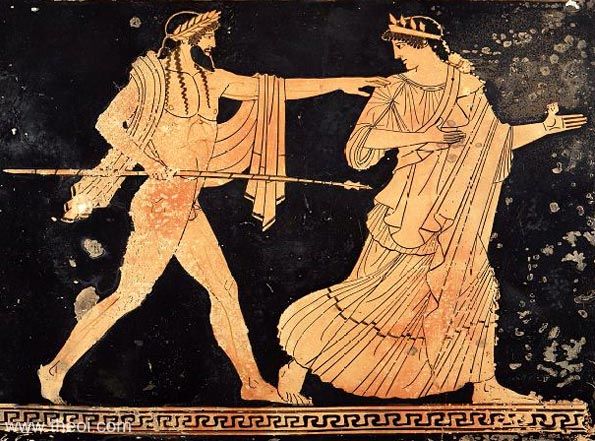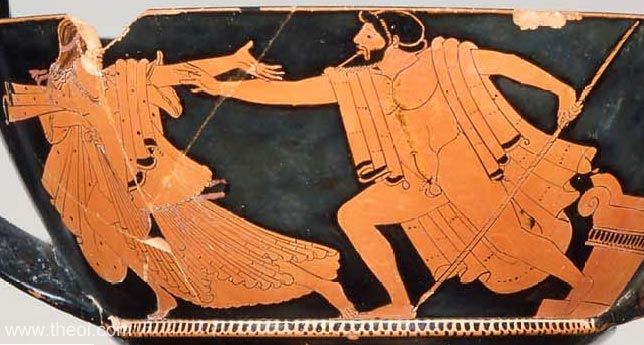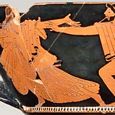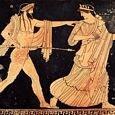AIGINA
Greek Name
Αιγινη
Transliteration
Aiginê
Latin Spelling
Aegina
Translation
Of Aegina Island

AIGINA (Aegina) was a Naiad-nymph loved by the god Zeus. He carried her off in the guise of an eagle to the island of Aigina which was named after her.
FAMILY OF AEGINA
PARENTS
[1.1] ASOPOS (Pindar Isthmian 8, Pindar Paean 6, Corinna Frag 654, Bacchylides Frag 9, Herodotus 5.80.1, Pausanias 2.29.2, Antoninus Liberalis 38, Hyginus Fabulae 52, Ovid Metamorphoses 7.615, Statius Thebaid 7.315, Nonnus Dionysiaca 7.210)
[1.2] ASOPOS & METOPE (Apollodorus 3.156 Diodorus Siculus 4.72.1)
OFFSPRING
[1.1] AIAKOS (by Zeus) (Hesiod Catalogues Frag 53, Pindar Isthmian 8, Pindar Nemean 7, Corinna Frag 654, Bacchylides Frag 9, Apollodorus 3.156, Pausanias 2.29.2, Diodorus Siculus 4.72.1, Antoninus Liberalis 38, Hyginus Fabulae 52, Ovid Metamorphoses 7.472, Nonnus Dionysiaca 13.201)
[2.1] MENOITIOS (by Aktor) (Pindar Olympian 9)
ENCYCLOPEDIA
AEGINA. Aeacus, a son of Zeus and Aegina, a daughter of the river-god Asopus. He was born in the island of Oenone or Oenopia, whither Aegina had been carried by Zeus to secure her from the anger of her parents, and whence this island was afterwards called Aegina. (Apollod. iii. 12. § 6; Hygin. Fab. 52; Paus. ii. 29. § 2; comp. Nonn. Dionys. vi. 212; Ov. Met. vi. 113, vii. 472, &c.) According to some accounts Aeacus was a son of Zeus and Europa. Some traditions related that at the time when Aeacus was born, Aegina was not yet inhabited, and that Zeus changed the ants (murmêkes) of the island into men (Myrmidones) over whom Aeacus ruled, or that he made men grow up out of the earth. (Hes. Fragm. 67, ed. Göttling; Apollod. iii. 12. § 6; Paus. l. c.) Ovid (Met. vii. 520; comp. Hygin. Fab. 52; Strab. viii. p. 375), on the other hand, supposes that the island was not uninhabited at the time of the birth of Aeacus, and states that, in the reign of Aeacus, Hera, jealous of Aegina, ravaged the island bearing the name of the latter by sending a plague or a fearful dragon into it, by which nearly all its inhabitants were carried off, and that Zeus restored the population by changing the ants into men.
Source: Dictionary of Greek and Roman Biography and Mythology.
CLASSICAL LITERATURE QUOTES
Hesiod, Catalogues of Women Fragment 53 (trans. Evelyn-White) (Greek epic C8th or 7th B.C.) :
"And she [Aigina (Aegina)] conceived and bare Aiakos (Aeacus), delighting in horses."
Pindar, Olympian Ode 9. 69 ff (trans. Conway) (Greek lyric C5th B.C.) :
"Menoitios (Menoetius), the child of Aigina (Aegina) and Aktor (Actor)."
Pindar, Nemean Ode 7. 82 ff :
"The almighty king of the gods [Zeus]. It was he, so runs the tale, begot great Aiakos (Aeacus) to be his son within a mortal [i.e. Aigina's] womb, and to be ruler of his country of splendid name."
Pindar, Nemean Ode 8. 6 ff :
"Such loves were shepherd to the bridal bed of Zeus and Aigina (Aegina), to bring them the Kypris' (Cypris') [Aphrodite's] gifts. And there was born a son [Aiakos (Aeacus)], king of Oinone (Oenone), peerless in counsel and in might of hand."
Pindar, Isthmian Ode 8. 16 ff :
"A man nursed in seven-gated Thebes to Aigina (Aegina) must offer the first flower of Kharis' (Charis') grace; for both [i.e. the eponymous nymphs Thebe and Aigina] were of one father born the youngest daughters of Asopos' river; and sovereign Zeus looked upon them with favour. One of these [Thebe] did he set by Dirke's lovely waters, to be queen of this city of charioteers, but you [Aigina] he carried to Oinopia's (Oenopia's) isle and wedded. And there you bore to the loud-roaring god of thunder Aiakos (Aeacus), a son divine, noblest of mortal men, who gave even to the gods decision of their strife."
Pindar, Paean Fragment 6 (trans. Sandys) (Greek lyric C5th B.C.) :
"Beside the waters of the Asopos (Asopus), he once carried off from the portal the deep-breasted maiden, Aigina (Aegina). Then did the golden tresses of the mist hide the over-shadowing ridge of your land, that so, on the couch immortal."
Bacchylides, Fragment 9 (trans. Campbell, Vol. Greek Lyric IV) (C5th B.C.) :
"The bright-belted daughters [of Asopos] whom gods settled with happy fortunes as founders of invoilate cities. Who does not know of the well-built town . . . of renowned Aigina (Aegina), who came to the bed of great Zeus and bore the hero [Aiakos (Aeacus)]."
Bacchylides, Fragment 13 (trans. Campbell, Vol. Greek Lyric IV) (C5th B.C.) :
"Daughter of the eddying river [Asopos], gentle-hearted Aigina (Aegina), truly Kronides (Cronides) [Zeus] has given you great honour, displaying among all the Greeks a new victory like a beacon; and some high-vaunting girl sings in praise of your power, often springing lightly on white feet over your sacred soil, as a carefree fawn towards the flowery hills, with her illustrious near-dwelling companions; and garlanded with the local adornment of crimson flowers and reeds those maidens sing, queen of a hospitable land, of your child [Aiakos (Aeacus)] and of rose-armed Endais, who bore godlike Peleus and the warrior Telamon after her union with Aiakos."
Corinna, Fragment 654 (trans. Campbell, Vol. Greek Lyric IV) (C5th B.C.) :
"Of these [nine] daughters [of Asopos] Zeus, giver of good things, took his [Asopos'] child Aigina (Aegina) . . from her father's house."

Aeschylus, Sisyphus the Runaway (lost play) (Greek tragedy C5th B.C.) :
Weir Smyth (L.C.L.) quotes Pherecydes, a C5th B.C. mythographer, in his discussion of the plot of this lost play: "According to the fabulous story told by Pherekydes (Frag. 78 in Müller, Fragmenta Historicum Graecorum) Sisyphos made known to Asopos that it was Zeus who had carried off his daughter Aigina (Aegina); in punishment for which offence the god sent Thanatos (Death) against the babbler."
Herodotus, Histories 5. 80. 1 (trans. Godley) (Greek historian C5th B.C.) :
"Thebe and Aigina (Aegina), it is said, were daughters of Asopos (Asopus) and sisters."
Pseudo-Apollodorus, Bibliotheca 1. 85 (trans. Aldrich) (Greek mythographer C2nd A.D.) :
"Sisyphos (Sisyphus) is punished in Haides' realm by having to roll a stone with his hands and head with the intents of pushing it over the top; but, though he keeps pushing, it always rolls back down. He suffers this punishment because of Asopos' daughter Aigina (Aegina). For when Zeus secretly made off with her, Sisyphos is said to have informed Asopos, who was searching for her."
Pseudo-Apollodorus, Bibliotheca 3. 156 :
"Metope--herself a daughter of the river Ladon--married him [the river Asopos (Asopus)] and bore two sons, Ismenos and Pelagon, and twenty daughters, of whom Zeus kidnapped one named Aigina (Aegina). Zeus kidnapped one named Aigina. As Asopos went looking for her, he came to Korinthos (Corinth) and learned from Sisyphos (Sisyphus) that the kidnapper was Zeus. Asopos started after the god, but Zeus sent him back to his own waters with thunderbolts--whence to this day coal is mined from this river. Zeus took Aigina to the island then known as Oinone (Oenone) but now called Aigina after her, where he mated with her and fathered a son Aiakos (Aeacus)."
Diodorus Siculus, Library of History 4. 72. 1 (trans. Oldfather) (Greek historian C1st B.C.) :
"Asopos (Asopus) made his home in Phlios (Phlius), where he married Metope, the daughter of Ladon, to whom were born two sons, Pelasgos and Ismenos, and twelve daughters, Korkyra (Corcyra) and Salamis, also Aigina (Aegina), Peirene, and Kleone (Cleone), then Thebe, Tanagra, Thespeia, and Asopis, also Sinope, and finally Ornia and Khalkis (Chalcis) . . . Aigina was seized by Zeus and taken off by him from Phlios to the island which was named Aigina after her, and lying with Zeus on this island she gave birth to Aiakos (Aeacus), who became its king."
Pausanias, Description of Greece 2. 5. 1 (trans. Jones) (Greek travelogue C2nd A.D.) :
"So runs the legend, that Zeus had ravished Aigina (Aegina), the daughter of Asopos (Asopus), but refused to give information to the seeker before he had a spring given him on the Akrokorinthos (Acropolis of Corinth). When Asopos granted this request Sisyphos turned informer, and on this account he receives punishment in Hades . . .
His [Asopos'] daughters, say the Phliasians, were Korkyra (Corcyra), Aigina, and Thebe. Korkyra and Aigina gave new names to the islands called Skheria (Scheria) and Oinone (Oenone)."
Pausanias, Description of Greece 2. 29. 2 :
"It was said that in the beginning there were no men in it [the island of Aigina]; but after Zeus brought to it, when uninhabited, Aigina (Aegina), daughter of Asopos (Asopus), its name changed from Oinone (Oenone) to Aigina; and when Aiakos (Aeacus), on growing up, asked Zeus for settlers, the god, they say, raised up the inhabitants out of the earth."
Pausanias, Description of Greece 5. 22. 6 :
"The Phliasians [of Sikyonia] also dedicated [at Olympia] a Zeus, the daughters of Asopos, and Asopos himself. Their images have been ordered thus: Nemea is the first of the sisters, and after her comes Zeus seizing Aigina (Aegina)."
Antoninus Liberalis, Metamorphoses 38 (trans. Celoria) (Greek mythographer C2nd A.D.) :
"Aiakos (Aeacus), son of Zeus and of Aigina (Aegina) daughter of Asopos."
Pseudo-Hyginus, Fabulae 52 (trans. Grant) (Roman mythographer C2nd A.D.) :
"When Jupiter [Zeus] wished to lie with Aegina, the daughter of Asopus, he feared Juno [Hera], and took the girl to the island of Delos, and there made her pregnant. Aeacus was their son. When Juno found this out, she sent a serpent into the water which poisoned it, and if anyone drank from it, he paid the debt to nature. Since Aeacus, his allies lost, could not protect himself on accou t of the scarcity of men, as he gazed at some ants, he begged Jupiter to give him men for defense. Then Jupiter changed tha nats into men, who were named Myrmidons, because in Greek ants are called Myrmekes. The island, however, has the name Aegina."
Pseudo-Hyginus, Fabulae 155 :
"Sons of Jove [Zeus] . . . Aeacus by Aegina, daughter of Asopus."
Ovid, Metamorphoses 6. 113 ff (trans. Melville) (Roman epic C1st B.C. to C1st A.D.) :
"In a golden shower [Zeus] fooled Danae, Asopis [Aigina (Aegina)] in a flame."
Ovid, Metamorphoses 7. 472 ff :
"Oenopia, the kingdom of the house of Aeacus; Oenopia the ancients called it till Aeacus himself gave it his mother's name, Aegina."
Ovid, Metamorphoses 7. 523 ff :
"Upon my [King Aiakos' (Aeacus')] people fell a fearsome plague through Juno's [Hera's] unfair rage, who hated us because our country took her rival's [Zeus' love Aigina's (Aegina's)] name."
Ovid, Metamorphoses 7. 615 ff :
"Great Juppiter [Zeus] . . . thou didst hold Aegina Asopis [daughter of Asopos] in thine arms, and thou, Almighty Father, art . . . my [Aiakos' (Aeacus')] parent."
Ovid, Heroides 3. 73 ff (trans. Showerman) (Roman poetry C1st B.C. to C1st A.D.) :
"Her lord's [Akhilleus (Achilles)] father, the grandchild of Jove [Zeus] and Aegina."
Statius, Thebaid 7. 315 ff (trans. Mozley) (Roman epic C1st A.D.) :
"In swollen wrath and vengeance for his [the river Asopos'] maiden daughter [Aigina (Aegina)] he lashes his waters to fury and scorns the Thunderer [Zeus] her paramour. For they say that Aegina was carried by force from her father's stream and hidden in the embrace of Jove [Zeus]; the River in wild rage prepares fierce war against the stars--not yet had even the gods such license--; in defiant, quenchless anger he stood and strove, nor had he any whose aid he could implore, till, scarce subdued by the threefold lightning of the brand, he yielded. Even yet doth the proud flood rejoice from out his heaving banks to pant forth 'gainst heaven fiery ashes, the signs of his dire punishment, and Aetnaean vapours."
Nonnus, Dionysiaca 7. 110 ff (trans. Rouse) (Greek epic C5th A.D.) :
"Eros (Love) . . . took out the divine quiver, in which were kept apart twelve firefed arrows for Zeus, when his desire turned towards one or another of mortal women for a bride. Right on the back of his quiver of lovebolts he had engraved with letters of gold a sentence in verse for each. On the back of his quiver of lovebolts he [the god Eros] had engraved with letters of gold a sentence in verse for each :--
The first takes Kronion (Cronion) to the bend of heifer-fronted Io.
The second shall Europa woo for the bold bull abducting.
The third to Plouto's (Pluto's) bridal brings the lord of high Olympos.
The fourth shall call to Danaë a golden bed-companion.
The fifth shall offer Semele a burning fiery wedding.
The sixth shall bring the King of heaven an eagle to Aigina (Aegina).
The seventh joins Antiope to a pretended Satyros (Satyr).”
Nonnus, Dionysiaca 7. 210 ff :
"Father Zeus now deceitfully changed his form, and in his love, before the due season, he flew above River Asopos, the father of a daughter [Aigina (Aegina)], as an eagle with eye sharp-shining like a bird, as he were now presaging the winged bridal of Aigina."
Nonnus, Dionysiaca 13. 201 & 212 ff :
"Aiakos (Aeacus) . . . whom the sham bird begot, mingling with [Aigina (Aegina)] the daughter of Asopos whom he carried off, the eagle, highsoaring Zeus the feathered husband of Aigina. He was named Aiakos from this marriage . . . he graved on his well-wrought shield, as a token of their origin, Zeus the sham bird with a mind, carrying a woman in gentle talons. Near it was a river-god [Asopos] on fire, and a girl [Aigina] beside him sad and downcast, even if she was a lifeless image; she turned her eyes aside as if mourning for her father stiffknee Asopos, and she seemed to be crying--‘A fine bridegift you have brought me, in destroying my father.’"
Nonnus, Dionysiaca 16. 55 ff :
"I would be a winged husband, to dance carrying lightly a wife on my back unshaken, as Kronides (Cronides) [Zeus] did with Aigina (Aegina); that mated with her I might beget a new eagle, another bridestar to attend on weddings for the Erotes (Loves)."
Nonnus, Dionysiaca 22. 390 ff :
"[When the Hydaspes river was stained red with Indian blood :] A Naias Nymphe (Naiad Nymph) in the river unshod, unveiled, peeped out of the stream and cried--‘Kinsman of the Naiades [Aiakos (Aeacus) son of Aigina]! With the blood of Zeus in your veins! . . . A Naias of the water was your own mother; yes, I hear that your Aigina (Aegina) was a River's daughter.’" [N.B. In Nonnus' Dionysiaca Aiakos accompanies Dionysos on his Indian campaign.]
Nonnus, Dionysiaca 24. 77 ff :
"Zeus as once before by the river Asopos, for the sake of Aigina's (Aegina's) bed, sailed now as an eagle flying high."
Nonnus, Dionysiaca 33. 296 ff :
"Near [the constellation] Kassiopeia (Cassiopea) he saw that Eagle [constellation Aquila] spreading his wings who bedded with Aigina (Aegina)."
Nonnus, Dionysiaca 39. 153 ff :
"[Aiakos (Aeacus) prays to his father Zeus :] ‘Come, O Father, monarch of life, monarch of battle! Send me an eagle, the auspicious herald of my birth . . . Yes, Father, remember Aigina (Aegina), and do not shame the bridegroom of thy bride, the love-bird of like feather with this!’"
ANCIENT GREEK ART
SOURCES
GREEK
- Hesiod, Catalogues of Women Fragments - Greek Epic C8th - 7th B.C.
- Pindar, Odes - Greek Lyric C5th B.C.
- Pindar, Fragments - Greek Lyric C5th B.C.
- Greek Lyric IV Bacchylides, Fragments - Greek Lyric C5th B.C.
- Greek Lyric IV Corinna, Fragments - Greek Lyric C5th B.C.
- Aeschylus, Fragments - Greek Tragedy C5th B.C.
- Herodotus, Histories - Greek History C5th B.C.
- Apollodorus, The Library - Greek Mythography C2nd A.D.
- Apollonius Rhodius, The Argonautica - Greek Epic C3rd B.C.
- Diodorus Siculus, The Library of History - Greek History C1st B.C.
- Pausanias, Description of Greece - Greek Travelogue C2nd A.D.
- Antoninus Liberalis, Metamorphoses - Greek Mythography C2nd A.D.
- Nonnus, Dionysiaca - Greek Epic C5th A.D.
ROMAN
- Hyginus, Fabulae - Latin Mythography C2nd A.D.
- Ovid, Metamorphoses - Latin Epic C1st B.C. - C1st A.D.
- Ovid, Heroides - Latin Poetry C1st B.C. - C1st A.D.
- Statius, Thebaid - Latin Epic C1st A.D.
OTHER SOURCES
Other references not currently quoted here: Euripides Iphigenia at Aulis 697.
BIBLIOGRAPHY
A complete bibliography of the translations quoted on this page.

